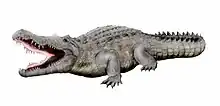Albertochampsa
Albertochampsa is an extinct genus of globidontan alligatoroid (possibly a stem-caiman[1]) from the Late Cretaceous of Alberta. It was named in 1972 by Bruce Erickson, and the type species is A. langstoni.[2] It is known from a skull from the Campanian-age Dinosaur Park Formation, where it was rare; Leidyosuchus is the most commonly found crocodilian at the Park. The skull of Albertochampsa was only about 21 cm long (8.3 in).[3]
| Albertochampsa Temporal range: Late Cretaceous | |
|---|---|
| Scientific classification | |
| Domain: | Eukaryota |
| Kingdom: | Animalia |
| Phylum: | Chordata |
| Class: | Reptilia |
| Order: | Crocodilia |
| Clade: | Globidonta |
| Genus: | †Albertochampsa Erickson, 1972 |
| Type species | |
| †Albertochampsa langstoni Erickson, 1972 | |
References
- Paula Bona; Martín D. Ezcurra; Francisco Barrios; María V. Fernandez Blanco (2018). "A new Palaeocene crocodylian from southern Argentina sheds light on the early history of caimanines". Proceedings of the Royal Society B: Biological Sciences. 285 (1885): 20180843. doi:10.1098/rspb.2018.0843. PMC 6125902. PMID 30135152.
- Erickson, Bruce R. (1972). "Albertochampsa langstoni, gen. et sp. nov. A new Alligator from the Cretaceous of Alberta". Scientific Publications of the Science Museum of Minnesota. new series. 2 (1): 1–13.
- Wu, Xiao-Chun (2005). "Crocodylians". In Currie, Phillip J.; Koppelhus, Eva (eds.). Dinosaur Provincial Park: A Spectacular Ancient Ecosystem Revealed. Bloomington: Indiana University Press. pp. 277–291. ISBN 0-253-34595-2.
This article is issued from Wikipedia. The text is licensed under Creative Commons - Attribution - Sharealike. Additional terms may apply for the media files.


